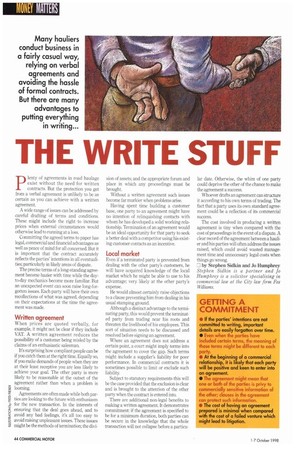THE WRITE STUFF
Page 46

If you've noticed an error in this article please click here to report it so we can fix it.
Many hauliers conduct business in a fairly casual way, relying on verbal agreements and avoiding the hassle of formal contracts. But there are many advantages to putting everything in writing...
plenty of agreements in road haulage exist without the need for written contracts. But the protection you get from a verbal agreement is unlikely to be as certain as you can achieve with a written agreement.
A wide range of issues can be addressed by careful drafting of terms and conditions. These might include the right to increase prices when external circumstances would otherwise lead to running at a lass.
Committing the agreed terms to paper has legal, commercial and financial advantages as well as peace of mind for all concerned. But it is important that the contract accurately reflects the parties' intentions in all eventualities; particularly in likely areas of dispute.
The precise terms of a long-standing agreement become hazier with time while the dayto-day mechanics become more familiar. But an unexpected event can soon raise long-forgotten issues. Each party will have their own recollections of what was agreed, depending on their expectations at the time the agreement was made.
Written agreement
When prices are quoted verbally, for example, it might not be clear if they include VAT. A written agreement reduces the possibility of a customer being misled by the claims of an enthusiastic salesman.
Its surprising how compliant people can be if you catch them at the right time. Equally so, if you make demands of people when they are at their least receptive you are less likely to achieve your goal. The other party is more likely to be reasonable at the outset of the agreement rather than when a problem is looming.
Agreements are often made while both parties are looking to the future with enthusiasm for the new transaction. In the interests of ensuring that the deal goes ahead, and to avoid any bad feelings, it's all too easy to avoid raising unpleasant issues. These issues might be the methods of termination; the divi
sion of assets; and the appropriate forum and place in which any proceedings must be brought.
Without a written agreement such issues become far murkier when problems arise.
Having spent time building a customer base, one party to an agreement might have no intention of relinquishing contacts with whom he has developed a solid working relationship. Termination of an agreement would be an ideal opportunity for that party to seek a better deal with a competitor using his existing customer contacts as an incentive.
Local market
Even if a terminated party is prevented from dealing with the other party's customers, he will have acquired knowledge of the local market which he might be able to use to his advantage; very likely at the other party's expense.
He would almost certainly raise objections to a clause preventing him from dealing in his usual stamping ground.
Although a distinct advantage to the terminating party, this would prevent the terminated party from trading near his roots and threaten the livelihood of his employees. This sort of situation needs to be discussed and resolved before signing an agreement.
Where an agreement does not address a certain point, a court might imply terms into the agreement to cover the gap. Such terms might include a supplier's liability for poor performance. In commercial contracts it is sometimes possible to limit or exclude such liability.
Subject to statutory requirements this will be the case provided that the exclusion is clear and is brought to the attention of the other party when the contract is entered into.
There are additional non-legal benefits to making a written agreement. It demonstrates commitment: if the agreement is specified to be for a minimum duration, both parties can be secure in the knowledge that the whole transaction will not collapse before a particu
lar date. Otherwise, the whim of one party could deprive the other of the chance to make the agreement a success.
Whoever drafts an agreement can structure it according to his own terms of trading. The fact that a party uses its own standard agreement could be a reflection of its commercial success
The cost involved in producing a written agreement is tiny when compared with the cost of proceedings in the event of a dispute. A clear record of the agreement between a haulier and his parties will often address the issues raised, which could avoid wasted management time and unnecessary legal costs when things go wrong.
El by Stephen Sicikin and Jo Humphrey Stephen Sidkin is a partner and Jo Humphrey is a solicitor specialising in commercial law at the City law firm Fox Williams.
GETTING A .1 COMMITMENT
• If the parties' intentions are not committed to writing, important details are easily forgotten over time.
• Even when the parties have included certain terms, the meaning of those terms might be different to each party.
• At the beginning of a commercial relationship, it is likely that each party will be positive and keen to enter into an agreement.
• The agreement might mean that one or both of the parties is privy to commercially sensitive information of the other; clauses in the agreement can protect such information
• The cost of having an agreement prepared is minimal when compared with the cost of a failed venture which might lead to litigation.
















































































































